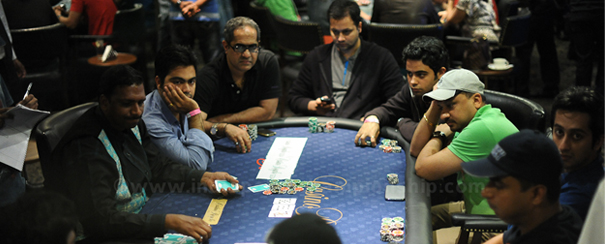Poker Sports League launched in India to revolutionize the card game with all legal aspects for Indian players.

Last few months India has seen lots of activities regards to gambling. There was news about the arrest of notorious online gambling ringleader Ramesh Chaurasia, the founder and boss of Game King Private Limited, which controled gaming parlors throughout the country. Also there was latest significant news about the launch of the Poker Sports League in India.
Promoted by Dabur Group vice-chairman Amit Burman and online poker website Adda52, and co-founded by Pranav Bagai and Anuj Gupta, the league aims to revolutionise and “sport-ify” the card game by bringing it to the masses.
But the question that arises is that is this legal game to enjoy. In India, the legality of various card games rest on whether it is a ‘game of skill’ which poker most certainly is.
Structured like a typical sports league, PSL comprises 12 franchisees who own city-based teams. Each team will have nine players who will compete in various online and live formats of poker. The grand finale of the league was scheduled at Casino Deltin Royale in Goa in the month of May 2017.
To avoid any allegation of gambling, the players who participate in the league do not have to pay any kind of participation or entry fee or wager any money. However, total prize money of Rs 3.36 crores will be awarded to the top teams, which would be distributed amongst the franchisees and players. PSL aims to earn revenues through advertisements and sponsorships, and will in the first year only be broadcast through YouTube and other online channels.
Since the PSL has excited India’s poker community it is believed that there are more than two lakh active poker players in India, and the number is steadily growing – few are aware about the legal status of the game. Since the game is played with cards and often involves the staking of money, the common perception is that the game involves gambling.
Is game of skill legal in India?
As per the Indian Constituion Gambling and betting are state subjects which means that states have their own legislations on preventing gambling. Most states have either adopted the Public Gambling Act, 1867, a British-era legislation that prohibits gambling in public places and in a ‘common gaming house’ or have framed their own legislations inspired by the Act.
Gambling legislations in all states, with the exception of Assam and Odisha, exempt from their ambit ‘games of skill’ or ‘games of mere skill’ wherever played. However, in most states, the list of games that comprise games of skill, or the parameters under which games can be classified as skill-based, have not been mentioned.

There are a few exceptions to this assertion – for example, the West Bengal Gambling and Prize Competition Act, 1957 exempts the games of rummy, poker, bridge and nap from the ambit of gambling. The Kerala government has notified a non-exhaustive list of games where skill predominates chance. The list of games include rummy, card games-28, 56, 112, ball throw, cup and coin contests and the like.
Also, the Nagaland government has recently enacted a new law to licence and regulate online games of skill. The law lists down various games such as sudoku, chess, bridge, rummy, poker, nap, virtual sports league fantasy games and the like within the ambit of skill games.
Nevertheless, in a scenario where the scope and ambit of the exemption granted to games of skill is unclear in most states, it is up to the judiciary to decide which games fall within the category of skill.
The verdict of supreme court
The Supreme Court in 1967 ruled that the game of rummy is one that involves skill as one has to memorise the cards that are picked by opponents. The court further noted that clubs could conduct the game of rummy for stakes and even charge reasonable fees for facilitating the game.
Similarly, in 1996, the Supreme Court held that betting on horse-races involved skill. The apex court also noted that for a game to be categorised as one involving skill, it has to be preponderantly and substantially a game of skill.
Several high courts have, while citing the two Supreme Court judgments, ruled that games of skill like rummy can be conducted for stakes and that authorities cannot interfere in games of skill even if players wager money.
So is Poker the game of skill or the game of chance?
If you look at what the court says then it is found that there has been no direct Supreme Court ruling on the status of poker. However, at least two high courts have held that playing poker is a legitimate activity and the matter is under consideration before a third high court.
In 2013, the Karnataka high court, based on a petition filed by K.N. Suresh, the secretary of the Indian Poker Association (IPA), directed the police to not interfere in the conduct of poker in clubs, particularly since the Bengaluru police had granted a ‘no-objection certificate’ for the conduct of such games.
The Calcutta high court in 2015, while disposing of a petition filed by IPA, passed a similar order directing the police to not interfere in games of poker. The order was based on the specific exclusion of the game of poker from the definition of gambling in West Bengal state gambling law.

In 2016, the IPA similarly initiated a petition in the Gujarat high court to get poker declared as a game of skill. IPA has further sought a direction from the court to ask the police to stop interfering from poker games wherever played. Some other clubs in Ahmedabad and Surat have also filed similar petitions in the high court. The matter is still pending before the court and is posted for hearing on June 9, 2017.
IPA and other poker companies argue that to consistently win in poker requires considerable mathematical and statistical analysis. One also has to be acquainted with game theory and be able to read other player’s expressions and calculate the probability of winning before betting in each hand, they assert.
They further argue that top universities like the Massachusetts Institute of Technology and Harvard have included poker in their syllabus to teach students negotiation skills, game theory and mathematics. Closer home, the Indian Institute of Management, Kozhikode, has also instituted a course on the strategy involved in poker. Economist Steven Levitt and chess champion Gary Kasparov have also argued that the game of poker requires considerable amount of skill.
The IPA, for its part, has already vowed to take the crusade of getting poker recognised as a skill game to other states as well. The upcoming is a poker club in the plush Radisson Blu Hotel in New Delhi is the one example of this expansion .
Though in coming years India will see the rapid expansion of poker and in case of any legal dispute it is for sure that given the example set by Supreme Court and high courts as well as international research and statistical evidence, other state courts would rule in favour of poker and this game will now be played as a full fledged game.